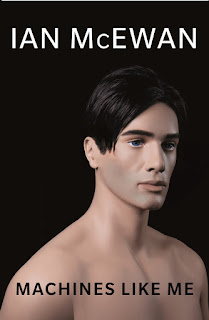Machines Like Me
Ian McEwan writes
about human dramas involving love and violence with force majeure, and Machines like Me does not let the McEwan reader
down. Published in the year after the bicentennial of Mary Shelley’s Frankenstein, McEwan’s narrator,
thirty-two year old Charlie – has a background in anthropology and an interest
in electronics. His girlfriend, Miranda, is writing a PhD on the Corn Laws – a
subtle connection to Shelley’s context. More directly, although not the
inventor/creator of Adam, Charlie is his human God in that he and Miranda make choices
about Adam’s personality, nurture the first stages of his life and slowly
introduce him to the world. Like the Creature, Adam's consciousness comes in
stages, while his conscience – if we
can call it that—centres on relentless algorithms of truth. Then there are
questions about monstrosity – the potential of the muscular Adam to break and
arm and worse; the introduction of a rapist and the monsters of the age (war,
the monstrosity of the body politic and a protest movement that might turn
violent when the whole machinery of the age stops working).
McEwan assembles his own monster from the parts of alternate
history, sci-fi and dystopia, wit and irony. It is 1982; Thatcher’s war against
Argentina over the Falkland Islands backfires; technology has gone ahead of the
present. At one point, a Tony Blair-like Labor PM toys with Brexit, while all
around the world things get better and worse at the same time (technology,
environmental, political change and upheaval). Charlie summarises all this in
the paradox of fear of the future and innovation that might yet prevent
disaster: ‘It was the golden age of the life sciences, of robotics – of
course, and of cosmology, climatology, mathematics and space exploration.’ It
was also ‘the gold age of organised crime, domestic slavery, forgery and
prostitution’ (and so on, pp.112-113).
A scene in which Miranda’s father – a near-man (musician,
writer and adventurer) argues about Montaigne and Shakespeare and mistakes Adam
for Charlie operates like the famous chess game when the master is beaten by
machine. Then again, even in Shelley’s time the Creature was smarter than the creator.
Ironically, the superior intelligence of these androids stops them from taking
over: once they understand the world and humankind, they opt for to shutdown rather than carry on (or
perhaps they are destroyed in rage, like Frankenstein on the Orkney Islands
under the light of the gothic moon).
Machines like Me
as a title may refer to Adam, but the title could equally refer to Charlie.
McEwan’s skill is to create a human drama (a love triangle, and questions of adoption
of Adam and a troubled boy) with the wider anxieties of our age. The book is told in a
straightforward, confessional tone, as if Charlie is on the dock rather than
Miranda, who has her own skirmish with the law. It is a tale full of literary
allusions but these are integrated with the light touch of a writer who knows
exactly which buttons to press and when. It is so exacting that it may be the
literary work of an android named McEwan 1.0.




Comments
Post a Comment